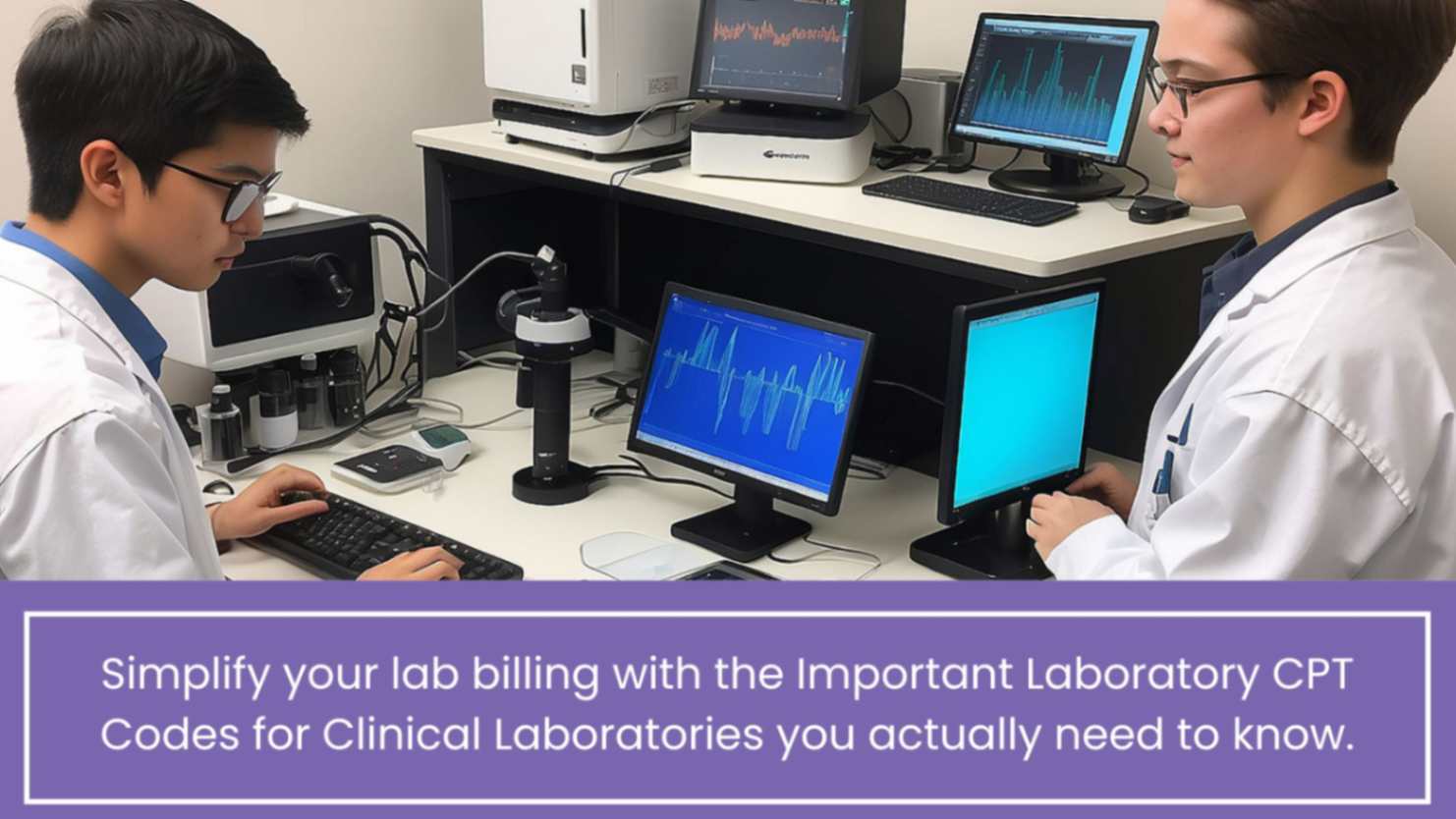Important Laboratory CPT Codes for Clinical Laboratories
At Practolytics, we get how stressful coding can be. The Important Laboratory CPT Codes for Clinical Laboratories aren’t just numbers — they’re the key to clean claims and steady cash flow. Whether it’s decoding the laboratory CPT codes list for clinical labs, figuring out CPT 81002 for urinalysis, or keeping up with molecular pathology CPT codes 81105–81479 overview, we’ve got your back. This guide breaks things down into simple explanations and helpful insights to ensure your lab gets paid on time and without the usual billing headaches.
If you work in a lab, you already know there’s a lot more to getting paid than just running tests. Behind every result that goes out the door, there’s a CPT code that tells payers exactly what you did. And if that code isn’t correct, your claim may sit in limbo — or worse, come back denied.
CPT (Current Procedural Terminology) codes are basically the language of healthcare billing. Every service, procedure, or lab test gets a specific number. It’s how labs communicate with insurance companies and Medicare.
For example, when you bill for a Basic Metabolic Panel, you don’t just describe it as “blood test.” You use CPT 80048 — that one number represents a set of specific tests. When it’s right, the payer knows exactly what was done and how much to pay you. When it’s wrong, your lab could end up waiting weeks (or months) to get reimbursed.
At Practolytics, we see this every day. Labs work hard, but a tiny mistake in coding can cause big payment problems. That’s why mastering the Important Laboratory CPT Codes for Clinical Laboratories is so essential.
Table of Contents
What Are Laboratory CPT Codes?
Let’s keep it simple. CPT codes are standardized numeric codes created by the American Medical Association (AMA). They describe every medical service or test imaginable.
When it comes to lab testing, CPT codes are how everything gets identified and billed. Each code tells the payer exactly what kind of test was done — whether it’s a basic blood panel or a complex genetic analysis.
Here are some common ones you’ll see all the time:
- CPT 80048 – This is for the Basic Metabolic Panel (BMP), the go-to test for checking electrolytes, glucose, and kidney health.
- CPT 80053 – The Comprehensive Metabolic Panel (CMP) adds liver function and protein checks to what’s in the BMP.
- CPT 81002 – A simple urinalysis done manually — no automated machines or microscopes involved.
- CPT 85025 – This covers the Complete Blood Count (CBC) with automated differential. It’s the standard test doctors order to check overall blood health.
- CPT 87880 – Used for infectious antigen detection, like quick strep or flu tests that give near-instant results.
- CPT 81445 – A molecular pathology panel code — usually for advanced genetic testing that digs deep into DNA-level analysis.
Each code corresponds to a specific test or set of tests. When used correctly, it ensures your lab gets paid exactly what it’s owed — no more, no less.
Importance of Accurate CPT Coding for Laboratories
Coding isn’t just paperwork — it’s revenue protection.
When your codes are accurate:
- Claims go through the first time, without delays.
- Your lab stays compliant with payer and CMS guidelines.
- Audit risks drop significantly.
- You maintain transparency and proper documentation for every test performed.
But when codes are off, the ripple effect is serious. We’ve seen labs lose thousands of dollars every month because of coding mismatches or outdated CPT ranges. Sometimes, it’s as small as a missed modifier. Other times, it’s a billing system that hasn’t been updated with the latest laboratory CPT code updates in 2025.
That’s why we at Practolytics don’t just handle billing — we handle accuracy. Our team of certified coders double-checks every code before submission, making sure your claims are clean, compliant, and ready to pay.
Classification of Cpt codes in Clinical Laboratories
CPT codes for laboratories fall into a few major categories, depending on what kind of testing you do.
1. Chemistry Panels
These are your standard lab tests like metabolic panels and organ function tests.
- CPT 80048 (Basic Metabolic Panel) includes electrolytes, BUN, creatinine, and glucose.
- CPT 80053 (Comprehensive Metabolic Panel) includes all of the above plus liver function tests.
2. Hematology Tests
These all the blood count studies. The most common is CPT 85025, which represents a complete blood count with automated differential.
3. Urinalysis Tests
For urinalysis without microscopy, you’ll use CPT 81002. This one’s common and often overlooked when it comes to proper documentation.
4. Microbiology Tests
These cover testing for bacteria, viruses, and other pathogens. CPT 87880 is frequently used for infectious agent antigen detection — for example, a rapid strep or flu test.
5. Molecular Pathology
These codes cover genetic and DNA-level testing. The molecular pathology CPT codes 81105–81479 overview includes a wide range of advanced tests used in oncology and precision medicine.
These categories make it easier to organize your billing system and prevent overlapping or double billing.
Most Common and Important Laboratory CPT Codes
If there’s one area that causes headaches for labs, it’s medical billing panels. Panels are groups of related tests that are often ordered together — for instance, a Basic Metabolic Panel or a Lipid Panel.
Here’s the key: if you perform all the tests in the panel, you bill the single panel CPT code. If you only perform some of the tests, you must bill each test individually.
For example, if you run all the tests in the Basic Metabolic Panel, you bill CPT 80048. But if you only do five of them, you can’t bill it as a full panel. You’ll need to use individual codes for each test performed.
It might sound minor, but it makes a big difference in reimbursement. Payers have sophisticated systems that detect “unbundling” or “over-billing” — and they’ll deny claims that don’t match their panel rules.
Practolytics helps labs navigate this with automated logic in your billing workflow, so the right code gets applied automatically based on which tests were run. It saves time, prevents errors, and keeps payments smooth.
Risks of Documentation and Compliance
Even if your codes are right, missing documentation can ruin a claim.
Many denials happen not because the code was wrong — but because the documentation didn’t support it. For labs, this usually means:
- The test order wasn’t signed by a physician.
- The medical necessity wasn’t clear.
- The wrong modifier was used (or not used at all).
Take the –90 modifier, for example. This one tells the payer that your lab referred the test to an outside reference lab. Without it, the payer might think you’re billing for a test twice and deny it.
These small details matter more than most labs realize. Our compliance specialists at Practolytics constantly review claims and educate teams on documentation best practices. We’d rather fix issues at the start than appeal them later.
Why to choose Practolytics?
Here’s the truth: laboratory billing isn’t easy. Between coding, compliance, payer rules, and constant updates, it’s a full-time job — and then some. That’s why so many labs partner with us.
At Practolytics, we:
- Handle end-to-end RCM, from coding and claims to follow-ups and collections.
- Have a team of specialized coders who know lab billing inside and out.
- Keep your lab compliant with all major payers and CMS.
- Stay ahead on industry updates, so you don’t have to worry about what’s changing next year.
- Use automation and analytics to find revenue opportunities you might be missing.
We’ve built our business around one goal — helping practices and labs get paid faster, more accurately, and with less stress.
Our clients stay with us because we act like part of their team. We don’t just process claims — we protect your revenue.
Bringing It All Together!
At the end of the day, understanding the Important Laboratory CPT Codes for Clinical Laboratories isn’t just about billing — it’s about keeping your business healthy.
When your codes are accurate and your documentation is airtight, you spend less time chasing payments and more time growing your lab.
Whether you’re billing a Basic Metabolic Panel (CPT 80048), an Infectious Agent Antigen Test (CPT 87880), or something from the molecular pathology CPT codes 81105–81479 overview, the goal is always the same — to get reimbursed quickly and compliantly.
At Practolytics, we make that happen by combining human expertise with technology. You’ll have coders who care, compliance specialists who watch your back, and systems that simplify your billing process.
We believe in making RCM simple, efficient, and transparent — so your team can focus on what really matters: delivering high-quality lab results that help patients.
Conclusion:
Mastering the essential Laboratory CPT Codes for Clinical Laboratories is one of the smartest things any lab can do. These codes may look small, but they have a huge impact on your bottom line. From CPT 85025 for blood counts to CPT 81002 for urinalysis and CPT 87880 for infection testing, accuracy makes all the difference between smooth payments and frustrating denials.
At Practolytics, we’re here to make that process painless. We handle the complex parts — coding updates, modifier rules, payer quirks — so your claims are clean and your cash flow stays strong. You focus on testing. We’ll make sure you get paid for it.
Why do CPT codes matter so much in my lab?
Because they tell payers exactly what you did. If your code doesn’t match your test, your claim won’t get paid correctly.
What’s the CPT code for a Basic Metabolic Panel and a Comprehensive Metabolic Panel?
The Basic Metabolic Panel (BMP) uses CPT 80048, and the Comprehensive Metabolic Panel (CMP) uses CPT 80053.
When should I use stacking codes instead of a panel code?
If you didn’t perform every test in a panel, bill each test individually. Only use the panel code if you did all the tests.
What does the –90 modifier mean in lab billing?
It shows that your lab sent the specimen to an outside reference lab for testing. It prevents double billing.
How do I bill for therapeutic drug monitoring (TDM)?
The CPT code depends on the method — whether it’s an immunoassay or chromatography. Always check payer rules before submitting.
ALSO READ – Decoding CPT: Your Guide to Codes and Regulations 2024
Talk to Medical Billing Expert Today — Get a Free Demo Now!






